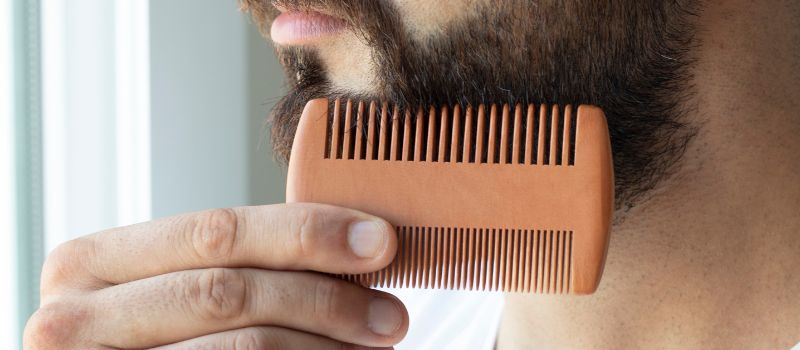You want to grow a beard. We get it; it’s manly, it’s rugged, and it makes you look good. You’ve tried everything under the sun to do it and you came out empty-faced.
You were taught in biology class that testosterone boosts men’s secondary sexual characteristics, which includes the beard. So, now you’re wondering if using testosterone boosters would help you grow your beard.
Let’s find out if it does, shall we?
The biology behind beard growth
Superficially, the science behind facial hair is simple; you need 2 things: Testosterone and the right combo of genes.
Let's address testosterone first. Males and females produce this sex hormone, although at varying levels. Usually, men have it way more than women. This hormone plays a crucial role in developing secondary sexual traits such as muscle growth, voice changes, body hair, and — drum roll — facial hair.
How does testosterone aid in growing facial hair? By interacting with the tiny hair follicles (sacs in the skin) you have on your face. It pigments them giving them a darker color and stimulating them to thicken.
However, testosterone without the right genetics won't give you a bushy beard. Numerous studies comparing men from different ethnic groups have discovered that individuals who develop less facial hair have the same hormone levels as those who do.
Although testosterone and the follicle are both ostensibly required for the growth of a beard, not all follicles react the same way to testosterone's chemical signal.
Some men's hairs have difficulty reading and responding to the signal from hormones, which results in a patchy beard. In short, genetic variations can alter your follicles' sensitivity to hormones.
Do testosterone boosters help: Yes and no!
Let’s assume you have the right genes because without them you can forget about growing a beard. That leaves testosterone as the only determining factor.
Based on that reasoning, the quick answer is: Yes, they help but only if you have low testosterone levels, to begin with. If you have the right genes and a healthy level of testosterone, you’re all set to grow a facial winter blanket.
They’re useless if your testosterone levels are in the healthy range.
While we’re talking about hair growth, let’s understand its stages. Facial hair grows in cycles, 3 to be exact:
Testosterone, after interacting with the hair follicles, transforms into a more effective form — dihydrotestosterone (DHT). Hair follicles are sensitive to DHT which stimulates them to push hair growth.
Low testosterone = low DHT.
This is when testosterone boosters come to the rescue. With enough testosterone in your system, your hair follicles are stimulated.
Testing your testosterone levels
You can’t seem to grow facial hair and you think your testosterone levels are the problem. Before you stick to that hypothesis, check if you have a combination of the following low-testosterone symptoms:
Should your suspicions grow, a blood test is typically required to determine testosterone levels. The male hormone levels are at their highest in the morning, making it the perfect time to conduct the test. To verify the measurements, the test must occasionally be repeated.
There are 3 different testosterone tests to measure the different forms of testosterone in the body:
- 1A total testosterone test: Measures testosterone that’s attached to proteins (usually, sex-hormone binding globulin
- 2A free testosterone test: as the name suggests, it measures free testosterone, which is the active form of the hormone.
- 3A bioavailable testosterone test: An uncommon test that measures both free testosterone and testosterone that is weakly bound to albumin — a blood protein. Similar to a free testosterone test, it could be used to identify some illnesses.
Searching for other causes
Genetics
Your genetics play a major role in determining the size of your beard. You'll probably be able to grow a full beard if the men in your family (including grandfathers and great-grandfathers) can grow them.
We've already established that testosterone, an androgen, is responsible for male characteristics like a deep voice and the capacity to grow facial hair. We've also established that testosterone transforms into DHT. This happens via the enzyme 5-alpha reductase.
DHT promotes the development of facial hair when it binds to receptors on your hair follicles. However, the sensitivity of your hair follicles to DHT also affects how strong its impact will be. Your genetics have a major role in determining this sensitivity.
Keep in mind that DHT restricts the growth of hair on your head even while it increases the growth of your beard.
Skin Condition
Facial hair follicles are part of your skin. Once they receive the signal from DHT, they initiate facial hair growth. However, if those hair follicles get clogged with nasty substances (oil, dirt, etc.), it inhibits the facial hair growth process.
Therefore, make sure to keep your face clean, wash your pillows and pillow sheets at least once a week (to remove the dirt and oils trapped there), and develop a skincare routine that’s conducive to your skin type (dry, oily, mixed, etc.)
Iron deficiency and anemia
Iron is an important mineral for hair growth and any condition where you’re iron-deficient can cause hair loss and the inability to grow facial hair.
The biological explanation is simple. Iron helps produce hemoglobin — a red-cell protein. Hemoglobin is responsible for carrying oxygen to every cell in the body, including hair cells. Oxygen itself is responsible for carrying out different cell functions.
Without hemoglobin, there isn’t sufficient oxygen in the cells, which stunts hair growth.
Other things you can do to improve beard growth
While genetics and hormones are the determining factors for beard growth, there are strategies for you to take your scraggly patch to the next level.
✔ Exercise
Aerobic training — cardio — pumps the blood throughout your entire body. With blood comes oxygen. With oxygen, cells achieve their functions. This includes facial hair follicles.
Strength and resistance training has been shown to boost testosterone levels. We’ve already covered the importance of the male hormone.

✔ Keep your diet in check
Believe it or not, obesity lowers testosterone levels. This is caused by “insulin resistance-associated reductions in sex hormone binding globulin”.
If testosterone boosters can help increase testosterone levels, try to consciously incorporate some of their ingredients in your diet. For example, you can get zinc from nuts and chickpeas, vitamin Bs from meats and poultry, and iron from beans and dried fruit.

✔ Stress less
Cortisol and testosterone are sorts of enemies. The more cortisol running around in your bloodstream, the lower the testosterone levels and vice versa.
Therefore, to keep the stress hormone in check, you should engage in relaxing activities. These activities include:
- Walks in nature
- Frequent physical activity
- Enjoying a hobby
- Socializing with loved ones
- Soaking out the sun

Conclusion
If your testosterone levels are down in the slumps, getting a boost may help you grow a beard or thicken your already-existent patch.
On the other hand, using testosterone boosters when your system is already efficient at pumping out testosterone is a useless endeavor because they won't address the root of your problems.
However, before you spend money on supplements, perform a testosterone blood test to precisely determine your hormone levels. That's the only way to ensure a return on investment. We advise you to use boosters if the blood test reveals that you are deficient in testosterone.
Finally, expect no immediate results, but know that if you are patient, they will come.
FAQs
Testosterone is a hormone; and hormones secretion — or lack thereof, is directly tied to internal, external, and environmental factors.
The internal factors include your piece of mind and how much stress you’re putting on your body.
If you’re prone to getting anxious, try stress-relieving activities like meditation, aromatherapy, or your own personal strategies that you have developed through your lived experience.
External factors include exercise, diet, and alcohol intake. By now you should the role of exercise in boosting testosterone. But what you may ignore is that your diet — if it ever focuses on too much-processed food — can impair your hormonal balance.
Alcohol becomes deadly to testosterone when consumed in excess. So, keep your intake moderate or low.
Environmental factors include how much vitamin D are you getting from the sun. Post-pandemic, working from home became a norm. Sometimes, you may not even leave the house. However, it’s imperative that you get a minimum of 20 minutes of sun exposure a day.
So, instead of brewing your coffee at home, take a walk to the nearest coffee shop, or have your break in the nearest park.
Never. When you’re shaving your beard, you’re only cutting off the top of the hair, leaving the follicle itself intact. It’s at the level of the follicle that the interaction with testosterone and DHT happens.
So, no, shaving more often won’t grow your beard.

